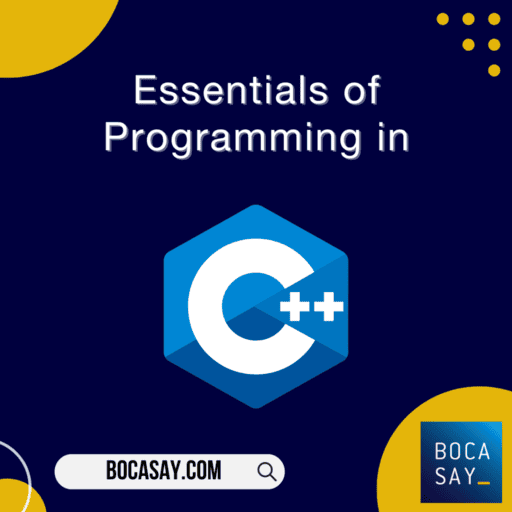Essentials of Programming in C++
One of the most widely-used and versatile computer programming languages out there, C++ can be found pretty much anywhere: search engines, operating systems, software applications, VR applications, air travel, movie productions and even space exploration!
C++ is ideal for building resource-light, large enterprise software infrastructure and applications. Able to interact directly with the actual computer hardware it uses to run, this language allows developers to fine-tune code optimization in any IT environment.
According to the Tiobe index, C++ gained the most popularity during the past year, and that’s why it has been established as the top programming language for the year 2022.
Considering C++ for your next project? In this article, Bocasay, our offshore outsourcing company, explores the unique features of C++ and provides examples of real-world applications.

What is C++ ?
Developed in 1979 by Bjarne Stroustrup and his team at Bell Laboratories, C++ is a general-purpose language and essentially an upgraded version of the C programming language. The main additions included the capacity for object-oriented programming, error and execution management, operator overloading and a namespace feature.
Industry Applications of C++ programming
Offering high-performance, reliability and low-resource requirements, C++ is widely used across a range of industries:
Operating Systems
Fast and energy-efficient, C++ is used within well-known operating systems like MacOS, Windows and mobile device operating systems like iOS.
Telecommunications
Critical components of telecommunication infrastructure rely on C++ to handle vast amounts of simultaneous communication fast and efficiently.
Artificial Intelligence
Perfect for executing complex machine learning models, C++’s low-level programming capacity makes it an ideal choice for developing AI applications.
Database Support
Popular database tools like MySQL and MongoDB are built on C++, supporting applications developed by Google, Adobe, Netflix and many others.
IoT Devices
C++ supports many of the embedded systems found within Internet of Things devices such as home appliances, cars, televisions and smartwatches.
Fin-Tech Tools
Processing millions of daily transactions with speed and reliability, C++ provides the code behind software for banking, trading and financial modeling.
Internet Browsers
Web browsers like Firefox, Google Chrome and Safari rely on C++ to develop back-end services for retrieving database information and rendering code.
Aerospace Industry
Powering commercial and military aircraft, C++ is commonly used to develop safety-critical flight software that supports every aspect of flight operations.
Digital Medicine
Widely present in a series of medical applications, C++ provides software for MRI machines, lab testing equipment and patient data processing systems.
Gaming
A real game-changer for the world of game development, C++ is behind many popular game brands and gaming consoles like PlayStation, Xbox and Nintendo.
Movie Production
Handling large high-quality files of raw video footage, C++ is used to create the impressive graphics and special effects of Hollywood movie productions.
Space Exploration
NASA and ISRO use C++ to program flight control software spacecraft, as well as software needed for managing various ground operations.
𝔸𝕣𝕖 𝕡𝕣𝕠𝕘𝕣𝕒𝕞𝕞𝕚𝕟𝕘 𝕝𝕒𝕟𝕘𝕦𝕒𝕘𝕖𝕤 𝕤𝕥𝕚𝕝𝕝 𝕒 𝕞𝕪𝕤𝕥𝕖𝕣𝕪 𝕥𝕠 𝕪𝕠𝕦? 𝕐𝕠𝕦 𝕟𝕖𝕖𝕕 𝕥𝕠 𝕕𝕖𝕧𝕖𝕝𝕠𝕡 𝕒 𝕤𝕠𝕗𝕥𝕨𝕒𝕣𝕖 𝕒𝕡𝕡𝕝𝕚𝕔𝕒𝕥𝕚𝕠𝕟, 𝕓𝕦𝕥 𝕪𝕠𝕦 𝕕𝕠 𝕟𝕠𝕥 𝕜𝕟𝕠𝕨 𝕨𝕙𝕖𝕣𝕖 𝕥𝕠 𝕤𝕥𝕒𝕣𝕥? 𝔻𝕠𝕟’𝕥 𝕡𝕒𝕟𝕚𝕔, 𝕥𝕙𝕖 𝕖𝕩𝕡𝕖𝕣𝕥𝕤 𝕠𝕗 𝕥𝕙𝕖 𝔹𝕠𝕔𝕒𝕤𝕒𝕪 𝕠𝕗𝕗𝕤𝕙𝕠𝕣𝕖 𝕠𝕦𝕥𝕤𝕠𝕦𝕣𝕔𝕚𝕟𝕘 𝕔𝕠𝕞𝕡𝕒𝕟𝕪 𝕒𝕣𝕖 𝕒𝕥 𝕪𝕠𝕦𝕣 𝕤𝕚𝕕𝕖 𝕥𝕠 𝕔𝕒𝕣𝕣𝕪 𝕠𝕦𝕥 𝕪𝕠𝕦𝕣 𝕕𝕚𝕘𝕚𝕥𝕒𝕝 𝕡𝕣𝕠𝕛𝕖𝕔𝕥𝕤 !
𝔻𝕠 𝕪𝕠𝕦 𝕙𝕒𝕧𝕖 𝕒 𝕢𝕦𝕖𝕤𝕥𝕚𝕠𝕟? 𝔸𝕤𝕜 𝕦𝕤!
𝔸 𝕢𝕦𝕠𝕥𝕖 ? 𝕀𝕥’𝕤 𝕗𝕣𝕖𝕖!
Top Features of C++ Programming
Object-Oriented Programming
Unlike its predecessor C, which is a procedural language, C++ is distinct for being an object-oriented programming language. This follows a programming protocol that organizes software design based on data, or objects, instead of functions and logic.
Mid-Level Programming
C++ can perform both low-level and high-level programming, and that’s why it is essentially considered a mid-level language. However, as its programming syntax also includes comprehensible English, many also view C++ as another high-level language.
Pointers
Providing solutions to IT problems that require efficient memory allocation, C++ supports pointers. Pointers are basically coding variables that contain the address of another variable. Their function is to ultimately guide software to the memory location of a particular variable.
Dynamic Memory Allocation
Precisely because of its use of pointers, C++ enables software to allocate memory distribution dynamically. This is useful because it allos developers to determine memory requirements during run-time, as they are often not aware in advance of how much memory space is needed.
Structured Programming
C++ is a structured programming language because its coding environment is modular, relying on functions, classes and objects. The advantage is that C++’s modular code is easier to understand and modify when compared with other programming languages.
Machine-Independence
Even if C++ is not platform-independent, it offers machine-independence. That means that programs compiled on Windows will not run on a Linux operating system, however, you can still write software that will run on different Linux, Windows and Apple machines.
Case-Sensitive
In contrast to other languages like HTML and MySQL, C++ is a case-sensitive programming language. This means that during software coding C++ will interpret uppercase and lowercase characters differently – for example by assigning different meanings to ‘a’ and ‘A’.
Compiler-based
Unlike Python and Java, within C++, software needs to first be compiled before it is executed. The advantages of compiler-based programming languages include
- Speed.
- Data security.
- Machine independence.
- Software optimization.
Libraries
Offering access to a rich library of built-in functions, C++ can save time and resources, enabling faster and cheaper software development. Libraries are valuable development tools because they are modular components of reusable computer code that has already been tested.
Simplicity
The relative simplicity of architecture and coding procedures of C++ make it a top choice for beginner programmers. Its software code can be divided into logical units, the auto keyword function saves a lot of programming time and its extensive library offers ready-made coding functionalities.

👉 Benefits of Offshore IT Development
There are a number of benefits that come attached with offshore IT development. They range from direct access to best-in-class developers and lower development risks, to reduced operational and development costs, faster project delivery, higher scalability, and access to the latest technologies. Here is a short list of offshore IT benefits:
→ Cost-Savings
→ Low-Risk
→ Fast Time-to-Market
→ Industry Experts
→ Endless Talent
→ Optimal Workflows
→ Cutting-Edge Technologies